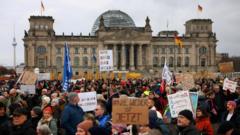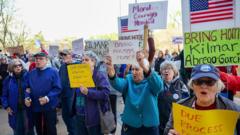A protest in Berlin involving around 160,000 people was sparked by political leaders' collaboration with the far-right AfD, urging mainstream parties to uphold democratic values. This protest reflects a significant backlash against perceived normalization of far-right politics ahead of the imminent national elections.
Mass Demonstration in Berlin Signals Growing Discontent with far-right Alliances

Mass Demonstration in Berlin Signals Growing Discontent with far-right Alliances
Approximately 160,000 protesters gather in Berlin to oppose cooperation with far-right party Alternative for Germany (AfD), highlighting increasing tensions in German politics ahead of elections.
Tens of thousands of demonstrators flooded the streets of Berlin on Sunday, protesting a controversial political maneuver that some Germans believe could undermine the democratic foundations of post-war politics. They gathered in response to recent voting behaviors by mainstream political parties, primarily the Christian Democratic Union (CDU), which has sought to ally with the far-right Alternative for Germany (AfD) on several non-binding resolutions regarding immigration.
CDU leader Friedrich Merz is currently positioned as a frontrunner for Germany's chancellor in the upcoming national elections, leading to anger over his attempts to consolidate support with the AfD. Organizers of the protest claimed that these actions breach the long-standing taboo in German politics of collaborating with far-right elements, which many citizens see as a dangerous precedent.
According to police estimates, approximately 160,000 people participated in the rally, which began at the Bundestag and marched towards the CDU's headquarters. Participants voiced their concerns, encapsulated in sentiments from 34-year-old protester Anna Schwarz, who stated that she felt compelled to engage politically as a response to the mainstream parties’ actions. The crowd chanted for "democratic" institutions to defend against far-right encroachments.
Amid these tensions, the CDU maintains its lead in the polls just weeks before the election, while the AfD has emerged as a significant challenger. They gained momentum from a non-binding immigration resolution passed in the Bundestag on Wednesday, although a more concrete bill proposing stricter immigration measures was narrowly rejected by parliament two days later.
Despite the internal strife, Merz defended his strategy, claiming that good ideas should not be discarded just because of the source of support. His predecessor, Angela Merkel, however, criticized his approach, asserting that he had reversed a previous commitment to avoid any form of collaboration with the AfD. The political climate in Germany continues to evolve as citizens grapple with the implications of these alliances in the context of national identity and democratic integrity.



















